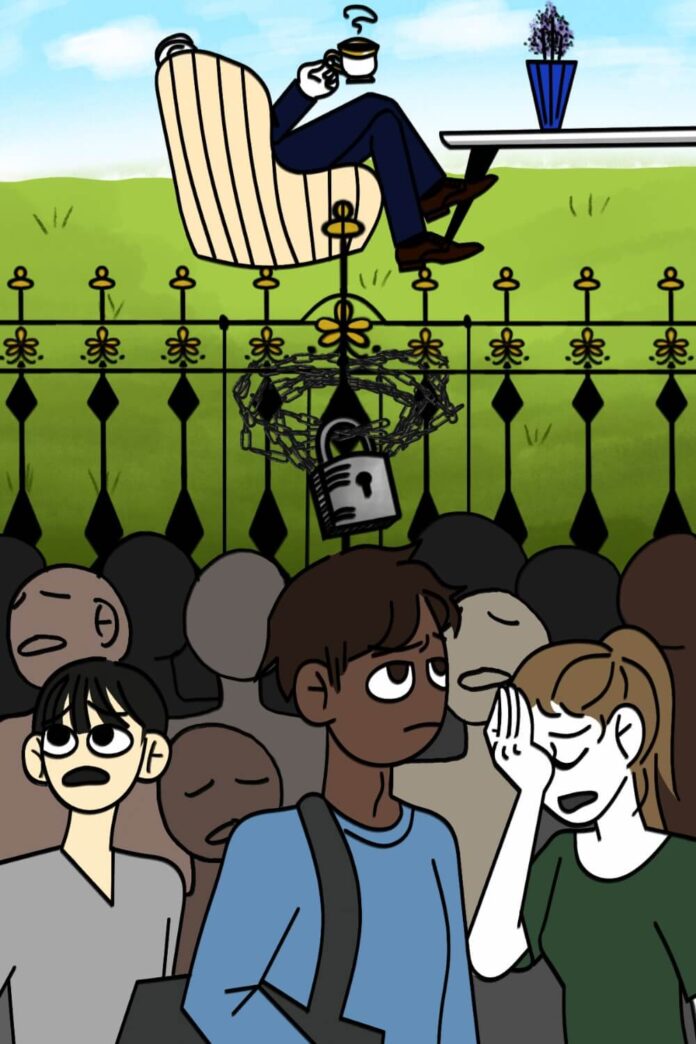When one thinks of economic inequality, they may think of Jeff Bezos or Elon Musk with their ungodly billions of dollars. They are the “one percent,” and if we simply taxed them, then we would solve our inequality problems. This narrative is compelling — think “We are the 99 percent”— but it is flawed.
Anti-“one percent” rhetoric overlooks a much more grave inequality — namely, the inequality created by the top 20 percent. In 2017, Brookings fellow Richard V. Reeves wrote the book “Dream Hoarders,” about how the “upper middle class,” or the top quintile, has seen its income and wealth skyrocket compared to the rest of the population over the past 50 years. While America as a whole got more prosperous, the relative upward mobility of Americans has fallen. The primary reason is “opportunity hoarding” — or what the upper middle class has done to perpetuate its status — starting with where people live.
The most likely indicator of someone’s health and overall livelihood is the ZIP code they grow up in. In cities such as LA, people are often barred from building lower-cost apartments. Of the land in LA that is zoned for residential housing, a full 75 percent is exclusively for higher-cost, single-family homes with a minimum lot size of 5,000 square feet — banishing working class people from much of the city.
America’s first major zoning laws restricting residential density were designed to exclude minorities from areas with opportunity. Through zoning, we have enriched those who were lucky enough to get in early and those who are able to afford outrageous costs of living. Exclusionary zoning is exacerbated by federal tax laws such as the mortgage interest deduction, property tax deductions and the untaxing of imputed rent, as well as the smorgasbord of local and state property tax laws such as Prop 13, the latter of which disproportionately benefits whiter, richer and older homeowners. The net effect of these laws is to not only drive up housing costs (as was found by Ed Glaeser and Joseph Gyourko in 2002), but also to hoard wealth and opportunity by preventing others from working and living in our great cities.
In January 2022, the Southern California Association of Governments (SCAG) voted to support a proposed initiative known as “Our Neighborhood Voices“ which would have repealed state laws such as SB 9 that lifted some of the most egregious zoning restrictions. SCAG viewed the initiative as protecting cities’ “local control” — a codeword for the ability to hoard wealth and opportunity for their affluent residents through exclusionary zoning that essentially encases cities in amber. SCAG and the supporters of the initiative coated these exclusionary impulses in social justice language, claiming that laws that enforced cities’ mandates to build affordable housing, protect the environment and allow multi-family housing type somehow hurt lower class people — who, by the way, are excluded through zoning from many of the very municipalities making those arguments.
The reason I write this piece is that, like many at this college, my family is part of the upper middle class. My home region of the San Francisco Bay Area is one of the wealthiest and most prosperous regions in not only the country but the entire world. And, the Bay Area is zoned 85 percent for single-family homes exclusively, boasting some of the highest home prices in the country. This issue is personal to me, and probably to you.
It is incumbent on us in the “upper middle class” to examine opportunity hoarding in our own lives. For example, consider this very college — Oxy prides itself on providing a liberal arts education that gives students breadth and depth in their studies. However, there is a flip side: the college maintains an air of exclusivity through low enrollment and legacy preferences. There may be legitimate reasons for this system, but is the denial of opportunity to 500 more students per year worth it for the “small school feel”? It is up to the college to decide, of course, but I personally don’t think so.
Opportunity hoarding is pervasive because we can’t see what might happen otherwise — no one thinks that their individual action of opposing an apartment building exacerbates inequality, but the sum total very much does. The compounding effects of zoning laws are staggering. Chang-Tai Hsieh and Enrico Moretti found that zoning laws in NYC and the Bay Area alone reduced aggregate wages by trillions of dollars per year — if zoning laws in those regions were loosened slightly, workers would have made an average of $9,000 more in 2009, overwhelmingly benefitting lower-income people. Is it really worth sacrificing that much money to keep apartments out of certain neighborhoods?
If you live in an exclusive suburb, join your local Yes in My Backyard (YIMBY) group, or start one. Get involved in local politics — write to, talk to and protest your local elected officials so they understand that opportunity hoarding through zoning is unacceptable. The “upper middle class” may be the problem now, but it can be the solution.
![]()































